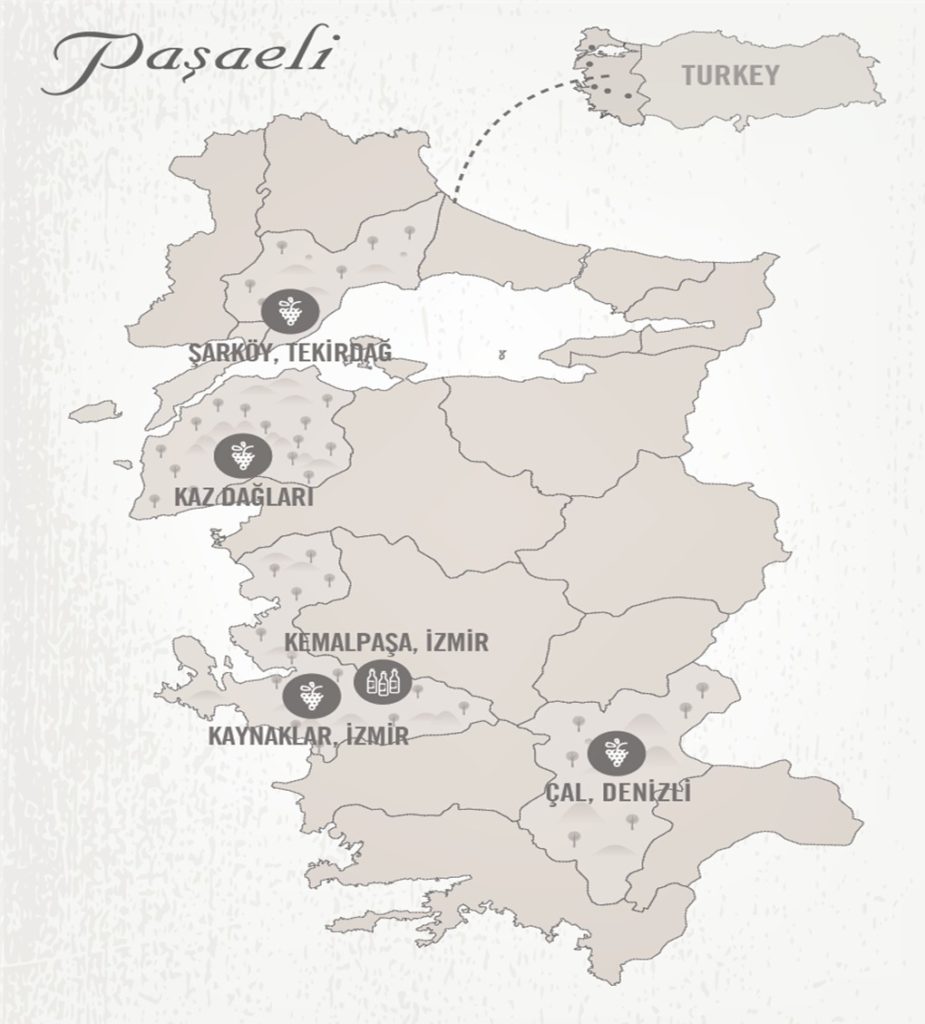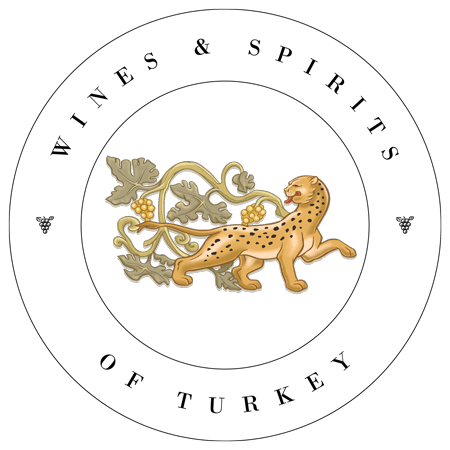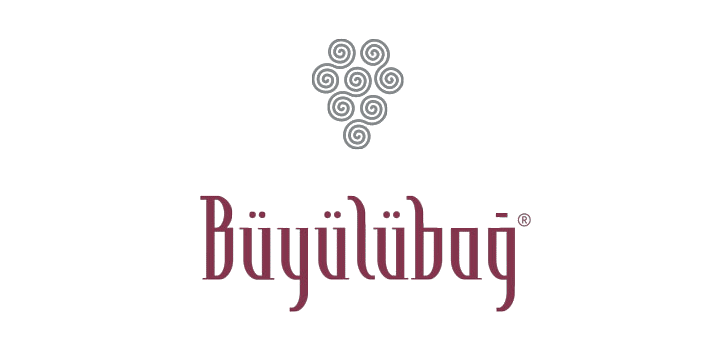
PASAELI
Pasaeli is one of the boutique wineries of Turkey with a production of around 150.000 bottles a year. Pasaeli makes wines as little as 500 bottles to a maximum of 15.000 bottles per sku.
The dream of producing wines started in January 2000 while continuing as a fine wine importer since 1993 which became one of the leading fine wine importers and distributors in the country.
Pasaeli has four vineyards of 15 hectares all in the western part of Turkey;
1. Kaynaklar, İzmir
This vineyard has a stony, gravely and clay red soil at an altitude of 235 meters which gives the possibility of day and night temperature differences during late August and early September, namely during the harvest period. It ensures that the grapes retain their acidity while reaching sugar and phenolic maturity. As a result, concentrated, full bodied and fruity, but at the same time balanced and elegant wines can be produced.
First planted in 2002, a single vineyard of 4 hectares near Kaynaklar village of Buca District of İzmir with varietals of Cabernet Sauvignon, Cabernet Franc, Merlot and Petit Verdot, appropriate for a typical Bordeaux blend. Pasaeli produces two different Bordeaux Blend wines from this vineyard, namely Kaynaklar and K2.
2. Hoşköy, Tekirdağ
Vineyards in Hoşköy have partly clay and limy soil with high mineral content. They are at altitudes of 140 to 160 meters, and open to the winds blowing from Sea of Marmara. Thus, the grapes stay “cool” during late August and early September and retain their acidity enabling to produce concentrated, full bodied and fruit driven big wines, but also balanced and elegant.
The grapes planted in this vineyard are Cabernet Sauvignon, Cabernet Franc, Merlot and Petit Verdot since 2003.
Later on, starting in 2005, Pasaeli started to plant Kolorko, an indigenous variety of Thrace in Turkey-in-Europe that had almost become extinct. It is an interesting variety that can turn into unique white wines with good acidity and minerality.
3. Şarköy, Tekirdağ
This vineyard in Şarköy has deep, well drained loamy soil with medium lime content (with an ideal pH for vine growing). It is 3 km inland from the Sea of Marmara directly facing the Sea and its winds. It is at 200 meters above sea level with a gentle slope that allows good drainage.
This vineyard has 50 plus year “old vines” that were planted in late 1960’s with Yapıncak variety which is an indigenous variety to Thrace in Turkey-in-Europe.
Pasaeli was the first winery in Turkey to bottle a 100% Yapıncak in 2011. In 2017, Pasaeli started to make a “skin contact” wine (aka orange wine and / or amber wine) with Yapıncak and started to plant more Yapincak to the adjacent vineyards.
4. Gedik, Çanakkale
Kaz Dağları is a national park that lies in the northern part of the Aegean region of Turkey. It is home to some 800 plants, many of them unique to Turkey. It is also home to jackals, mountain deers, wolves, bears, rabbits, lynxes, squirrels, wild boars and many birds, and home to evergreen forests, small lakes, waterfalls, creeks, and home to 1000 springs.
The vineyards surrounding the village generally run from 300 meters to 600 meters above sea level. And almost all of them face towards to south varying from south-east to south to south-west.
Old Vines 6N Karasakız , 6N Karasakiz, Sidalan and Cakal ( Jackal ) varieties are grown in this vineyard.
Every year Pasaeli plants a little more, growing the production. All wines are made with fruit from single vineyards, so all “terroir” wines. That’s why the vineyards are spread out to the “homeland” of each of these varieties.
Since from the beginning, Pasaeli has been strong believers in the indigenous varieties of Turkey, in fact the true treasures being proud of Kolorko variety’s progress from a possible extinction to an export wine.
Pasaeli`s passion to save the indigenous varieties from extinction and ensure that it is passed to the future generations will continue… Stay tuned…

TOMURCUKBAG
Tomurcukbag was founded in 2002 by Prof.Dr. Y.Sabit Agaoglu after working nearly 20 years to resurrect the Turkish black grape variety, Kalecik Karasi.
In fact, in the early 1970s, Kalecik Karası was very nearly extinct. At the time, Prof. Dr. Ağaoğlu was working on a Ph.D. in agriculture at Ankara University. For his thesis project he decided to make a clonal study of the Kalecik Karası grape.
From a few dried vines he not only earned his Ph.D. but also created a vineyard. And since he already had the vineyard, he and his wife (a physicist in profession) decided to go ahead and make wine. When the couple finally founded their own establishment, they gave the name of their only daughter Tomurcuk to their winery. Tomurcuk means sprout, or blossom, in Turkish, expressing their wish for their wines to blossom in the wine world. Their hope came true within a decade or so; the small vineyard was to produce some of the biggest wines of the region, made with minimum intervention, using indigenous yeast all naturally.
The winery is located in the homeland of Kalecik Karası grape, Kalecik, Ankara, in the lands where this special and naive Anatolian grape grows best, in its real terroir. These soils, which are rich in minerals; Kalecik Karası is an organic soil that is loved by the grape variety. Tomurcukbağ vineyards located in the Kızılırmak valley are 10 acres. The winery has a capacity of 30.000 bottles per year maintaining its boutique character.
Prof. Dr. Ağaoğlu is widely regarded as the godfather of this grape.
Kalecik Karasi, bottled under the label “Trajan” falls into that nebulous “natural” category. The vineyards are organic, hand-harvested, nothing is added or extracted during the winemaking, and wines ferment with the yeast that comes in on the grapes. Wines are not aged at all in oak. While natural wine may not have been the phenomenon, it is now when Tomurcukbag first started making wine, his desire to make wine like this had nothing to do with popularity or marketability. He wants people to taste the vintage variation each year.
BUYULUBAG
After years of working as a senior executive in a multinational company, Mr. Alp Törüner decided to pursue his dream of winemaking. He has chosen Avsa, an island on Marmara Sea with a history of viticulture and winemaking since 1800s. Büyülübağ Winery was established in 2003 aiming to produce high quality wine from high quality grapes.
After producing Cabernet Sauvignon firstly, Büyülübağ’s vision is to grace the indigenous grape variety ‘Adakarası’ with international awareness and to exploit the potential of the well-adapted cosmopolitan grape varieties in the Avsa Island’s terroir.
The Vineyards – nearly 20 hectars- consist of Cabernet Sauvignon, Merlot, Syrah, Chardonnay and also indigenous variety Adakarası. The vine stocks of local grape ‘Adakarası’ are 35 years old on an average. Cluster type is short, berries are oval, skin is purple and thick.
Avsa Island is located in the middle of the Marmara Sea, therefore has the typical climate of the region. The unique microclimate of the island has common features both with the Mediterranean and the Black Sea region. During the summer the island is affected by the north, northeast winds. Being located between two different regions, the island has short storms during summer caused by the cold weather front on the north.
Vineyards lay against the cool northeaster breeze that helps to slow the ripening and create intense flavour compounds.
Büyülübağ winery is a multi-level ‘gravity flow’ facility sloping towards the sea using Bordeaux style winemaking techniques. Annual production capacity is 200.000 bottles.



